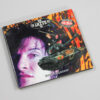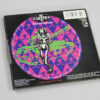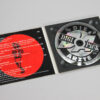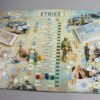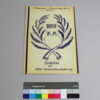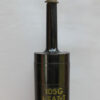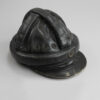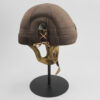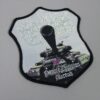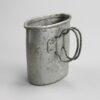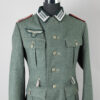CD “Die Ärzte – Friedenspanzer”, 1994
Inventory number: DPM 7.479.1-2
“Friedenspanzer” was the third single from the comeback album “Die Bestie in Menschengestalt” by Berlin punk band Die Ärzte. The album won three gold records for over 750,000 sales. Die Ärzte originally formed in 1982 as a counter-project to German punk bands, whose lyrics were too serious and political for them and were mostly directed against the state and the police. From the very beginning, Die Ärzte’s trademark was their humorous to absurd lyrics without an obvious political message, some of which ended up on the index. Despite their commercial success, the band broke up in 1988.
In the years that followed, the musicians were marked by the racially motivated excesses of violence after the first joyous frenzy following the fall of the Wall, in which dormitories for contract workers and refugees were set on fire and their residents attacked and threatened. In 1993, right-wing extremists murdered five people in an arson attack in Solingen. Singer and guitarist Farin Urlaub wanted to re-found Die Ärzte, but he realized that the old direction would no longer work after 1993. He was able to win back founding member, singer and drummer Bela B. for the new formation. Rodrigo Gonzáles, who had previously played with Bela B. in the band “Depp Jones”, joined as bassist. The comeback album “Die Bestie in Menschengestalt” was the band’s most political record to date. For the first single release, they chose the song “Schrei nach Liebe” (Cry for Love), in which the musicians took a clear stance against the neo-Nazis who had given the band its new direction.
The new bassist Rodrigo Gonzáles wrote the music for “Friedenspanzer” back in the 1980s. Gonzáles had fled with his family from Chile to Hamburg in the early 1970s and had played in various bands since his youth. He reworked the song together with Bela B. for the album “Die Bestie in Menschengestalt”; they wrote the lyrics within a day.
The peace tank shoots “to save this world” with “flowers instead of grenades” “love in your heart” and “brings peace without pain.” It not only brings peace, but also saves the environment and ends famine. Against the backdrop of the Yugoslavian wars, the theme of the song was topical and relevant – the dream of peace in Europe after the dissolution of the bloc confrontation had not been fulfilled.
The single “Friedenspanzer” was released with other songs such as “Die Wiking Jugend hat mein Mädchen entführt” in 1994 and reached number 32 in the German singles charts. The cover features an American M47 with Tiger livery. This livery was used by the US Army in the Korean War (1950-1953) to intimidate enemy fighters, but more on M46 and Sherman tanks. Production of the M47 only began during the Korean War and they were never used by the US armed forces. The picture of a painted M47 used for the cover comes from the packaging of a Matchbox 1:32 tank model from around 1992. The vehicle shown there has a gun shield that was never installed on the M47. It seems to be inspired by the gun shield used by the Bundeswehr on the M48 A2GA2. The choice of armor seems to have no comprehensible connection to the song lyrics. Farin Urlaub and Rodrigo Gonzáles are mounted above the tank and the face of singer Bela B. appears oversized against a psychedelic background.
While Die Ärzte stayed away from overly serious political content at the time of their formation and ridiculed what they saw as the precocious lyrics of some German rockers, they have since become a political band themselves. However, they combine serious topics with the classic humor of Die Ärzte. The band still exists today with the same line-up and also takes a political stance in their private lives.
Object of the month
(short) stories from the depot
Unfortunately, many objects cannot currently be shown in the exhibition for conservation reasons. Here you will find unusual objects and exciting stories of special pieces from the depot


